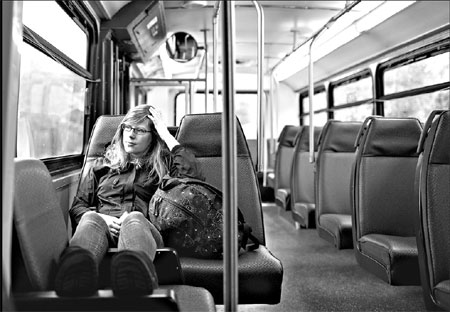More young Americans homeless and jobless
Updated: 2013-02-03 07:37
By Susan Saulny (The New York Times)
|
|||||||||||
|
Anna Wiley,20, said she had spent the night at a shelter in Seattle, instead of going home, because her parents were also in dire straits. Matthew Ryan Williams for The New York Times |

SEATTLE - Duane Taylor was studying in a community college and living in his own place when he lost his job in a round of layoffs. Then he found, and lost, a second job. And a third.
Now, with what he calls "lowered standards" and a tenuous new position at a fast-food restaurant, Mr. Taylor, 24, does not make enough to rent, or share, an apartment. He sleeps in a homeless shelter, except when his sister lets him sleep on her couch.
"I'd like to be able to support myself," Mr. Taylor said. "That's my only goal."
Across the United States, tens of thousands of underemployed and jobless young people are struggling to house themselves in the wake of the recession, which has left workers between the ages of 18 and 24 with the highest unemployment rate of all Americans.
Those who can move back home with their parents - the so-called boomerang set - are the lucky ones. But that is not an option for those whose families have been hit hard by the economy. Without a stable home address, they are a group that stays elusive, hoping to avoid the lasting stigma of public homelessness.
These young adults are the new face of a national homeless population, one that poverty experts say is growing. Yet the problem is mostly invisible. Most cities and states have not made special efforts to identify young adults, who tend to shy away from ordinary shelters out of fear of being victimized by an older, chronically homeless population.
The Obama administration has begun an initiative with nine communities, most of them big cities, to seek out those between 18 and 24 who are without a consistent home address.
"Years ago, you didn't see what looked like people of college age sitting and waiting to talk to a crisis worker because they are homeless on the street," said Andrae Bailey, the executive director of the Community Food and Outreach Center, one of the largest charitable organizations in Florida. "Now that's a normal thing."
In Washington, Lance Fuller, a 26-year-old with a degree in journalism, spent the end of November packing up a two-bedroom apartment he could no longer afford after being laid off. Mr. Fuller said he had been unable to keep a job for more than eight months since graduating from the University of Florida in 2010.
"Thankfully, I have a girlfriend who is willing to let me stay with her until I get back on my feet again," said Mr. Fuller, who writes a blog, Voices of a Lost Generation. "It's really hard for people in my generation not to feel completely defeated by this economy."
Mr. Taylor said he felt lucky when he could find a coveted space at Roots, a shelter for young adults in a church basement. Such shelters are rare.
For generations, services for the homeless were directed to two groups: dependent children and older people. There was scant attention focused on young adults.
"I see them coming back day after day, more defeated, more tired out, wondering, when will it be my turn?'" said Kristine Cunningham, executive director of Roots. "And it's heartbreaking. This is the age when you want to show the world you have value."
Shelters designed with young adults in mind are usually small. Roots holds only 35 people, and a nightly lottery decides who gets a spot. It is expanding to 45 beds.
Anna Wiley, 20, and her boyfriend, Bobby Jollineau, 24, spent several nights at Roots in December, but they were unable to get in one night in November. "We ended up sleeping outside," Mr. Jollineau said.
Asked whether she could go to her parents' home, Ms. Wiley said that her father is unemployed and that her mother works in a deli, making about as little as she does.
Across town, Roman Tano, 20, woke up recently at YouthCare's James W. Ray Orion Center, another shelter for young adults that offers training programs. Three months ago, Mr. Tano gave up an apartment in his native Dallas after losing his job. He sold his Toyota and sought opportunities in the Pacific Northwest.
He rented a room and set out with his resume (expertise: fund-raising). But when his $2,000 in savings withered to nothing, "I ended up sleeping on the street for the first time in my life," he said. "I just kind of had to walk around and try to stay warm."
Mr. Tano had been staying at the shelter for a month. He had a new job as a canvasser for an environmental organization.
"After I get my paycheck," he said brightly, "I should be on my way."
The New York Times
(China Daily 02/03/2013 page10)
Today's Top News
Police continue manhunt for 2nd bombing suspect
H7N9 flu transmission studied
8% growth predicted for Q2
Nuke reactor gets foreign contract
First couple on Time's list of most influential
'Green' awareness levels drop in Beijing
Palace Museum spruces up
Trading channels 'need to broaden'
Hot Topics
Lunar probe , China growth forecasts, Emission rules get tougher, China seen through 'colored lens', International board,
Editor's Picks

|

|

|

|

|

|






